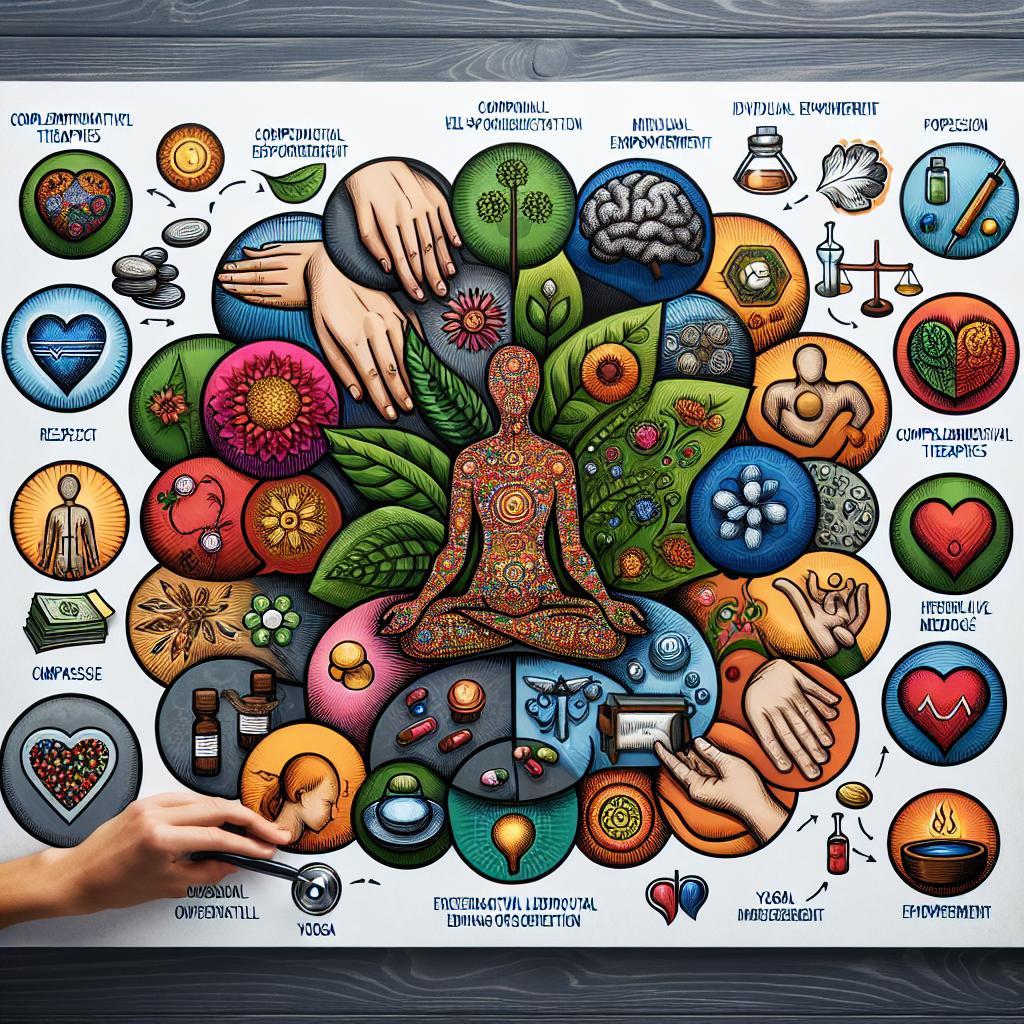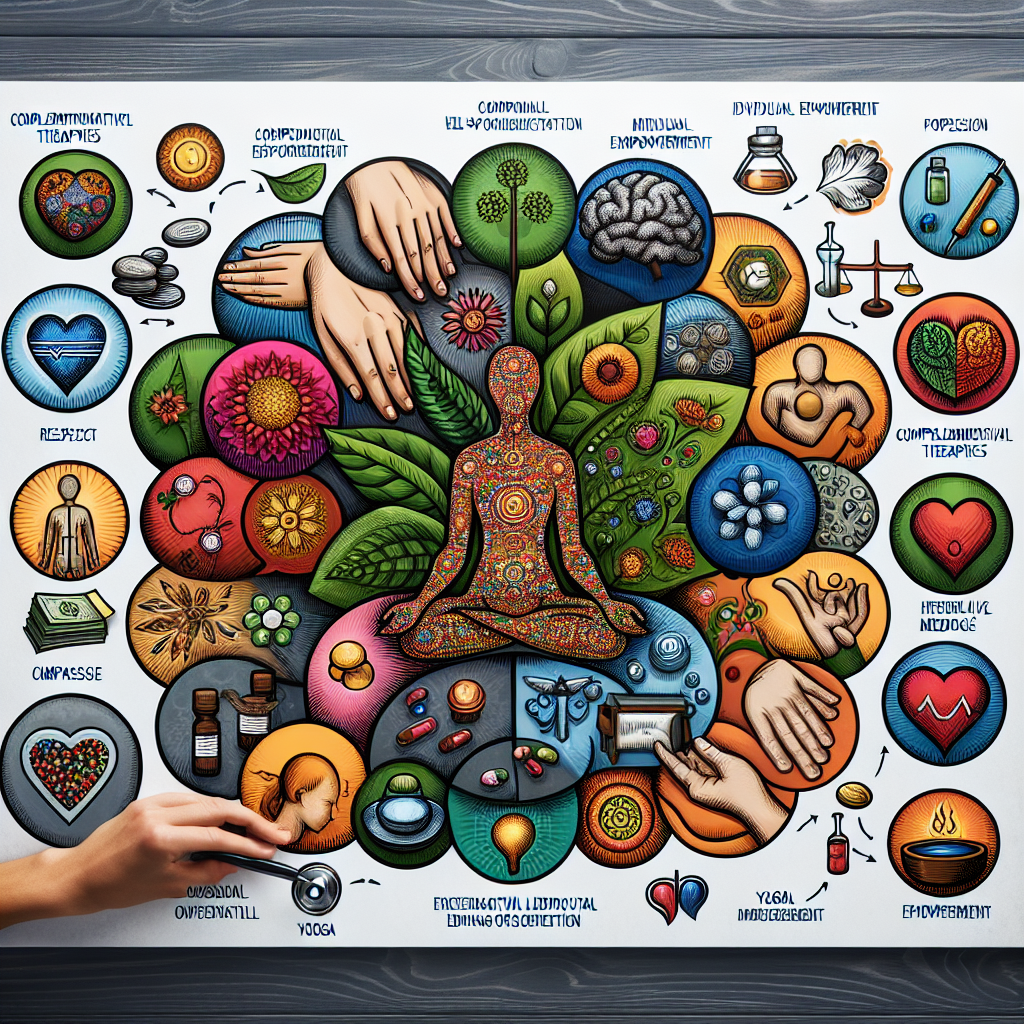Imagine a world where health and wellness are not just about the absence of physical ailments, but also about nurturing the mind, body, and soul. In this realm, holistic healing takes center stage, focusing on the individual as a whole rather than just treating symptoms. But what underpins this practice? What are the ethical foundations that guide holistic healing? In this article, we explore the principles that shape this transformative approach to healthcare, shedding light on the importance of compassion, respect, and empowerment in the quest for optimal well-being. Prepare to embark on a journey that challenges traditional paradigms and invites you to consider the profound impact of ethics on holistic healing.

What Are the Ethical Foundations of Holistic Healing?
Holistic healing is an approach to healthcare that takes into account the whole person – mind, body, and spirit – rather than just focusing on specific symptoms or ailments. It recognizes the interconnectedness of all aspects of a person’s well-being and seeks to promote wellness and balance in all areas of life. Ethical foundations play a crucial role in guiding practitioners of holistic healing, ensuring that they uphold principles of respect, integrity, and safety in their practice.
Definition of Holistic Healing
Holistic healing encompasses a wide range of practices and modalities, including acupuncture, massage therapy, herbal medicine, energy healing, and more. It is a patient-centered approach that aims to address the root causes of illness or imbalance, rather than simply treating the symptoms. This comprehensive approach considers not only the physical body but also the emotional, mental, and spiritual aspects of a person’s being.
Understanding the Importance of Ethics in Holistic Healing
Ethics provide the foundational principles that guide the actions and behaviors of holistic healers. They ensure that practitioners act in the best interest of their clients, promoting trust, safety, and integrity in the healing process. By adhering to ethical standards, holistic healers can establish and maintain a professional and trustworthy relationship with their clients.
Promoting Wellness and Balance
Focusing on the Whole Person
One of the key ethical foundations of holistic healing is the focus on treating the whole person. Instead of viewing clients solely as a collection of symptoms or ailments, practitioners take a holistic approach by considering the physical, emotional, mental, and spiritual aspects of an individual. This comprehensive perspective allows for a more nuanced understanding of the underlying causes of illness and facilitates a more effective treatment plan that addresses the root issues.
Recognizing Interconnectedness and Interdependence
Holistic healing recognizes the interconnectedness of all aspects of life, including the individual’s environment, relationships, and social context. This ethical foundation acknowledges the influence that these external factors have on a person’s well-being. Practitioners of holistic healing understand the importance of addressing these interconnected aspects to achieve true balance and wellness.
Respecting Individual Autonomy
Informed Consent and Shared Decision Making
Respecting individual autonomy is an ethical principle that holds that individuals have the right to make decisions about their own healthcare. In holistic healing, practitioners emphasize informed consent, ensuring that clients have a clear understanding of the proposed treatments, potential risks and benefits, and available alternatives. Shared decision making allows clients to actively participate in their own healing process, empowering them to make choices that align with their values and preferences.
Respecting Cultural and Spiritual Beliefs
Holistic healing practices often encompass cultural and spiritual dimensions, recognizing the importance of personalized beliefs and traditions. Ethical holistic healers respect and honor the cultural and spiritual background of their clients, understanding that these beliefs may influence their understanding of health and wellness. By incorporating these aspects into the healing process, practitioners can provide more inclusive and effective care.
Do No Harm
Avoiding Exploitation and Charlatanism
An essential ethical foundation of holistic healing is the commitment to avoid exploitation and charlatanism. Holistic healers are aware of the power dynamics inherent in the healer-client relationship and strive to maintain a professional and ethical standard of care. They avoid making false claims or promises that could mislead clients, and they ensure that their practices are grounded in evidence-based knowledge and reputable training.
Ensuring Competence and Qualifications
The ethical practice of holistic healing requires practitioners to have the necessary knowledge, competence, and qualifications in their specific modalities. This ensures that clients receive safe and effective care. Holistic healers pursue regular training, stay updated on the latest research and developments in their field, and maintain a commitment to ongoing professional development.
Patient Safety and Protection
Ensuring Confidentiality and Privacy
Respecting client confidentiality and privacy is a fundamental ethical principle in holistic healing. Practitioners prioritize the protection of their clients’ personal and sensitive information, ensuring that it is kept confidential and only shared with appropriate consent or legal obligations. This commitment to privacy creates a safe and trusting space for clients to share their health concerns and experiences.
Adhering to Ethical Codes and Standards
Ethical codes and standards provide guidelines for the professional conduct of holistic healers. These codes outline expectations for ethical behavior, such as maintaining professional boundaries, avoiding conflicts of interest, and promoting patient safety. By adhering to these standards, practitioners can ensure that their actions align with ethical principles and promote the well-being of their clients.
Avoiding Unsubstantiated Claims and Misleading Practices
Promoting Evidence-based Approaches
Holistic healing places importance on evidence-based approaches, which rely on scientific research, clinical evidence, and empirical observations. By basing their treatments and recommendations on credible evidence, practitioners reduce the risk of making unsubstantiated claims or engaging in misleading practices. This ethical foundation ensures that clients receive accurate and reliable information about potential benefits and risks.
Providing Honest and Transparent Information
Ethical holistic healers prioritize honest and transparent communication with their clients. They provide clear and accurate information about their treatments, including their benefits, limitations, and potential side effects. By promoting open dialogue, practitioners empower clients to make informed decisions about their health while fostering a trusting and collaborative therapeutic relationship.
The Role of Holistic Healer as Teacher and Facilitator
Empowering and Educating the Individual
Holistic healers see themselves as teachers and facilitators, working alongside their clients to empower them to take an active role in their own healing journey. They provide education and guidance, helping clients understand the underlying causes of their health issues and teaching them self-care practices to promote long-term wellness. This emphasis on education fosters a sense of personal responsibility and encourages clients to make positive choices for their well-being.
Encouraging Personal Responsibility and Self-Care
Central to holistic healing is the belief that individuals have the power to influence their own health outcomes. Ethical practitioners encourage clients to take personal responsibility for their well-being, emphasizing the importance of self-care and empowering clients to make choices that support their health goals. By fostering a sense of agency and empowerment, holistic healers promote long-term self-empowerment and resilience.
Maintaining Professional Boundaries
Avoiding Dual Relationships
Maintaining professional boundaries is a vital ethical practice in holistic healing. Holistic healers understand the importance of establishing and maintaining a therapeutic relationship that is free from conflicts of interest or personal biases. They avoid engaging in dual relationships, such as becoming romantically involved with clients or providing services outside of their professional scope. By upholding these boundaries, practitioners can ensure that their focus remains solely on the well-being of their clients.
Recognizing and Managing Potential Conflicts of Interest
Holistic healers are vigilant in identifying and managing potential conflicts of interest that may arise in their practice. They carefully consider any financial or personal relationships that may compromise their ability to provide unbiased and objective care. By transparently disclosing any potential conflicts and taking appropriate steps to mitigate them, practitioners uphold the ethical principle of prioritizing their clients’ well-being above all else.
Sustainability and Environmental Consciousness
Promoting Health without Harm
Holistic healing recognizes the interconnectedness of nature and the impact it has on human well-being. Ethical holistic healers prioritize practices and treatments that promote health without causing harm to the environment or contributing to unsustainable practices. By adopting a sustainable and environmentally conscious approach, practitioners contribute to a healthier planet and support the long-term well-being of individuals and communities.
Respecting the Interconnectedness of Nature
Ethical holistic healers understand that human health is intricately linked to the health of the environment and all living beings. They value the interconnectedness of nature and strive to promote balance and harmony within ecosystems. Practitioners incorporate eco-friendly practices into their treatment plans, emphasizing the importance of living in harmony with the natural world for the benefit of both individuals and the planet.
Collaboration and Integration
Working with Conventional Medical Practitioners
Ethical practitioners of holistic healing recognize the importance of collaboration and integration with conventional medical practitioners. They respect and value the expertise and knowledge of different healthcare disciplines and understand that the best outcomes for clients often come from a combined approach. By working collaboratively, holistic healers can provide comprehensive and well-rounded care that addresses all aspects of a client’s health.
Adopting a Team Approach for Patient Care
The ethical foundation of collaboration extends to adopting a team approach for patient care in holistic healing. Effective communication and coordination among practitioners of different modalities ensure that clients receive coordinated and integrated care. This team-based approach emphasizes shared decision making, mutual respect, and ongoing collaboration to support the well-being and optimal outcomes for clients.
In conclusion, the ethical foundations of holistic healing are rooted in principles of respect, integrity, safety, and well-being. By embracing these ethical principles, holistic healers uphold the highest standards of professionalism and promote the best interests of their clients. From promoting wellness and respecting individual autonomy to ensuring patient safety and avoiding misleading practices, ethical considerations serve as guiding principles for the practice of holistic healing.

